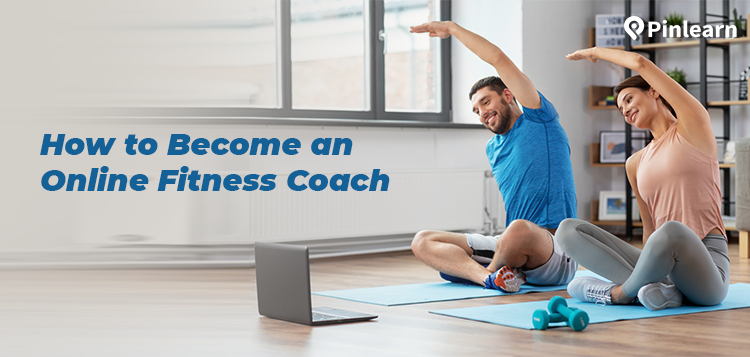How to Become an Online Fitness Coach
Do you wish to convert your passion for fitness into a lucrative online career? If so, becoming an online fitness coach is a smart move! It offers a lot of personal and financial freedom without compromising your passion. With technological advancements and a cultural shift towards health, “virtual exercise” is no longer a passing trend but the future of the fitness industry.
As you step into this new fitness frontier driven by video classes and home workouts, the first question that intrigues you is: how to become an online fitness coach?
This detailed guide walks you through all the steps to becoming an online fitness coach. Whether you are planning to transition into full-time online fitness coaching or start a side hustle, this blog is your ultimate guide! Are you ready to be the next popular online fitness coach?
Essential Checklist to Become an Online Fitness Coach
Before delving deeper into how to be an online fitness coach, let’s see how well-equipped you are for this new pursuit!
This quick 8-point checklist gives you an overview to get the basics right:
- A basic certification in Personal Training or specialization.
- Theoretical knowledge on basics of fitness coaching covering exercise, science, nutrition, safe training practices.
- Practical skills for training your clients, including strength training, injury prevention, fitness assessment and evaluation.
- Physical stamina to train clients for long hours.
- Accommodation and equipment at home, such as hand weights, exercise mats, resistance bands, camera, lighting, etc.
- Good communication, listening, time-management and organizational skills.
- Conflict-resolution and problem-solving skills to help clients achieve their goals.
- Credibility and a solid online presence to attract new clients.
How to Become an Online Fitness Coach: A Detailed Guide
Now, you have a good grasp of everything you need to start your online personal training business. Next, let’s delve into the mechanics of how to become an online fitness coach from scratch!
1. Get a Basic Certification
To start your journey as a fitness coach, it’s good to get certified. Certification equips you with the essential knowledge, skills, and safe practices to train your clients. Most importantly, it gives you a foundation and the confidence to step into the massive fitness industry.
Choose a basic certification that’s accredited and covers the fundamentals of fitness. For most certifications, you need to be over 18 years old, have a high school/ GED diploma and have CPR/AED certification.
Here’s a list of recognized certification bodies to get certified from:
- International Sports Sciences Association (ISSA)
- National Academy of Sports Medicine (NASM)
- American College of Sports Medicine (ACSM) (Gold standard certification)
- National Strength and Conditioning Association (NSCA) (Gold standard certification)
- American Council of Exercise(ACE)
- National Council for Certified Personal Trainers(NCCPT)
- National Council on Strength and Fitness(NCSF)
- Canadian Society of Exercise Physiology(CSEP)
2. Looking Your Part
The best way to market your fitness coaching business is to be a model yourself!
Be a representation of what you advise and demonstrate to your clients!
For instance, consider A and B, who are fitness coaches. A “looks the part” and B “books smart” (has academic knowledge about fitness).
Whom would you choose as your fitness coach?
Obviously, A, right?
It’s essential to be in shape for this job. However, you don’t need to be Arnold Schwarzenegger or Usain Bolt with a muscular physique and six-pack abs. But it’s good to maintain a healthy lifestyle and be fit enough to demonstrate the exercises and techniques during training.
Moreover, if you have decided to be an online fitness coach, having a good physique doesn’t hurt. Take a cue from the social media handles of famous fitness coaches: brimming with intensive workouts, sweating out with cardio, sprints, and marathons. It’s picture-perfect!
3. Gain Expertise with In-person Clients
Starting a virtual coaching business requires less investment and offers more convenience! Hence, people often start directly with online coaching.
However, here’s the truth: the online fitness coaching industry is competitive!
And it’s all the more essential to have a unique value proposition and learn the ropes of the trade in a physical setting like a boutique gym first.
This helps you get your fundamentals right, such as anatomy, movement competency, injury-safe practices and how to interact and motivate clients. Starting with in-person clients also helps you build a good network, even your first online clients.
As the age-old adage goes, “Experience is a hard teacher!” You learn a lot from your successes and mistakes, and this chisels you to be a better mentor.
By gaining practical experience, you can also figure out what you’re good at.
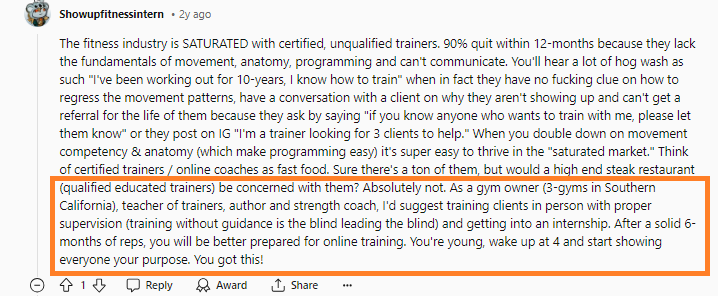
4. Choose a Speciality for Transitioning to Online Business
Now that you have gained real-world knowledge, you are halfway there! But before you start with online coaching, it’s crucial to niche down. After all, they say, “Riches are in the niches.”
Having a niche helps you market your business, earn profits early, and stand out in the market. A few popular niches are strength and conditioning, weight loss, pre-and postnatal fitness, sports coaching, and CrossFit training.
But the question is: how do you zero in on the right niche?
Tips to find the right niche
Reuben Brooks, the popular lifestyle creator, recommends his 5-step process to determine the right niche.
- Reflect on Your Passions and Interests
Analyze what got you into fitness in the first place, things you love to consume online and recollect the challenges you helped your past clients or someone overcome. This gives a better idea of who your ideal client is!
- Identify Customer Problems & Needs
Understand their pain points, wants and desires. This helps you set your niche based on your client’s existing problem.
- Research the Competitors
Identify 5 to 6 fitness coaches offering solutions in the same niche. Gather insights from their branding, message, offerings, and overall how they are running their business.
- Define Your Unique Value Proposition and Evaluate the Profitability
Now, before you finalize your niche, it is essential to find a unique value proposition. What can make your online fitness business stand out? For example, if your niche is strength training and the target audience is men over 40, your USP could be something like HIT training for men over 40.
Next, evaluate the profitability of your niche. Consider customer demographics, values, age, location, and profession to determine whether your clients can afford your offerings.
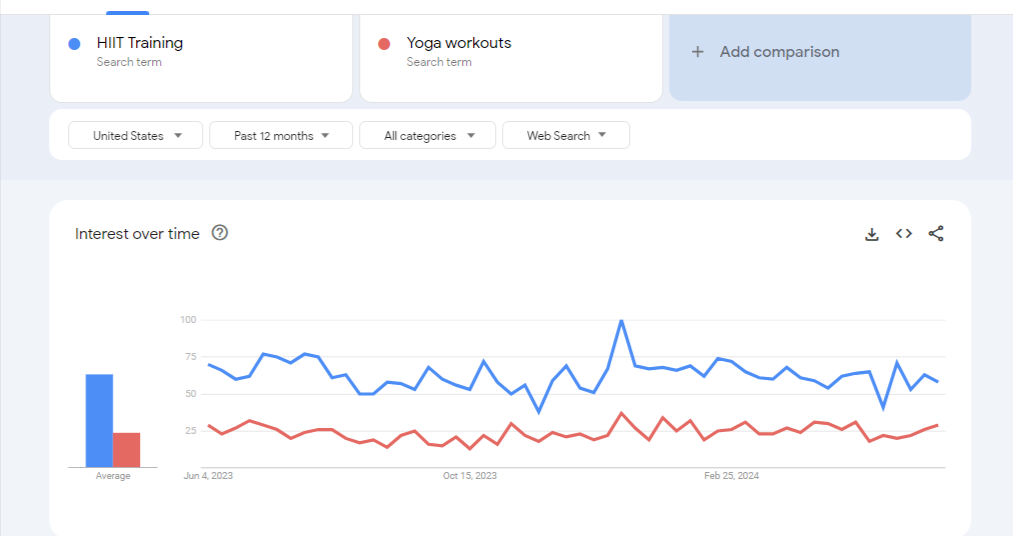
- Get Feedback From Your Audience When Stuck
Finally, Brooks recommends asking for feedback from the audience when stuck. This could be through social media(if you have a considerable audience) or communities and forums.
Here are some super-specific niches to step into the online fitness arena:
- Weight-loss and muscle-building for women
- Holistic prenatal fitness coaching and postpartum core rehab
- Body-strengthening and body composition improvement for women
- Fat loss and muscle-building for men over 30
- Personal training for career-driven parents and professionals
- Nutritional plans for women
- Strength and sports-performance training for athletes
- Military fitness training for men
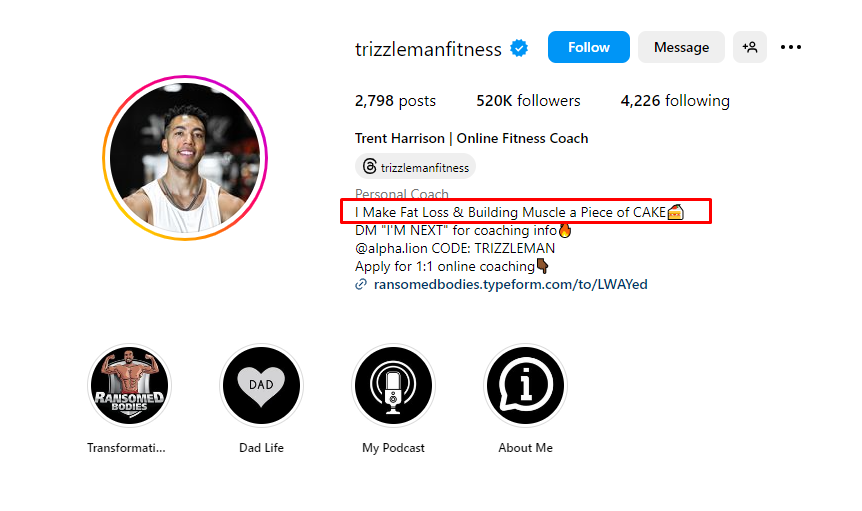
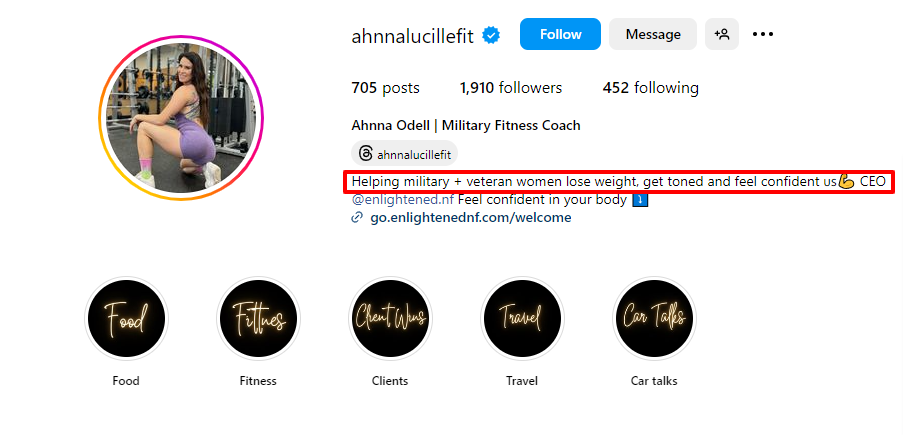
5. Setting Goals for Your Coaching Success
Before you create your fitness coaching programs or start your marketing strategies, you need the right direction! Setting goals helps you stay on track and streamline your business. Break long-term goals into smaller, achievable goals or milestones.
Basically, your business could have three types of goals:
-
Long-term Goals
Long-term goals are like fast-forwarding your business narrative three to five years down the road. For example, Earning $250k in the next 2 years or training a fixed number of clients within the next 3 years.
-
Short-term Goals
Long-term goals can be broken down into short-term objectives, defining your daily or monthly routine. Short-term goals are measurable and help you attain specific results. For example, if your goal is to make $10,000 within the first three months, break your goals into finding 10 new prospects daily.
-
Revenue Goals
Revenue goals could be either yearly or targets for a shorter timeline. For example, earning around $200,000 per year can be broken down into monthly or hourly targets.
An effective way of setting these goals is by using the well-known SMART (Specific, Measurable, Achievable, Relevant and Time-Bound) methodology.
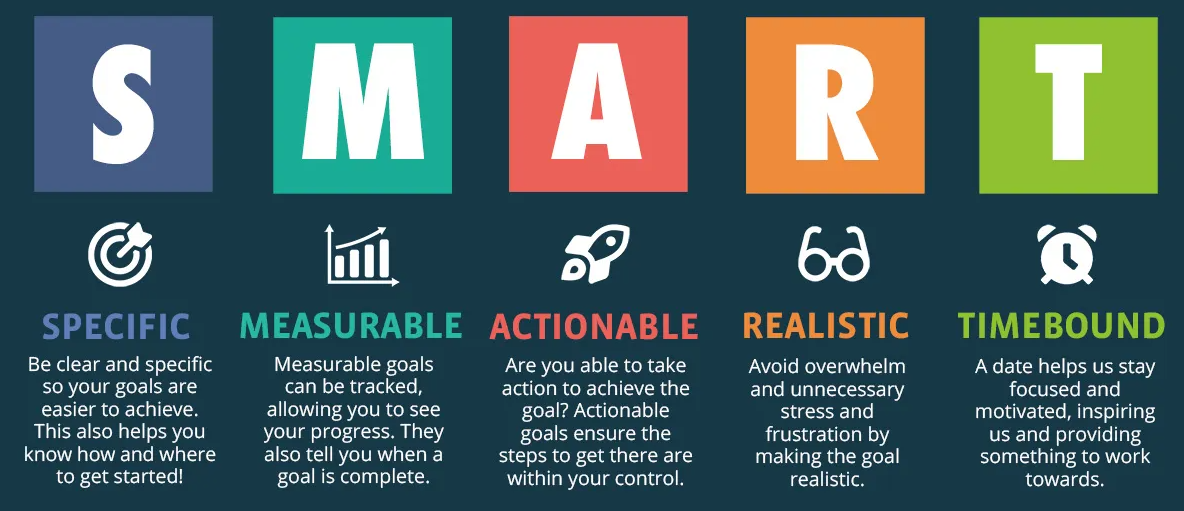
6. Build Your Brand
Branding is the overall perception of your business. Building a stellar brand isn’t all about visuals, logo and design. It’s also about the consistency of your services and reputation.
As an online fitness coach, equating branding with captivating logos and visuals could be a major pitfall. Understand your niche and target audience; show them the value of working with you. That’s why you need to create content that adds to your credibility.
Create your personal brand first, then build your business brand! Because people connect with people!
Leverage Social Media
You could start by building a solid social media presence on Instagram, LinkedIn, Facebook, or TikTok. Come up with an effective tagline that aligns with your brand. Ideate a unique content strategy, such as posting motivational posts on Mondays, tutorials on Tuesdays, workout videos on Wednesdays, etc.
Massy Arias is a reigning Insta-famous influencer with around 2.9 Million followers and 4,490 posts.

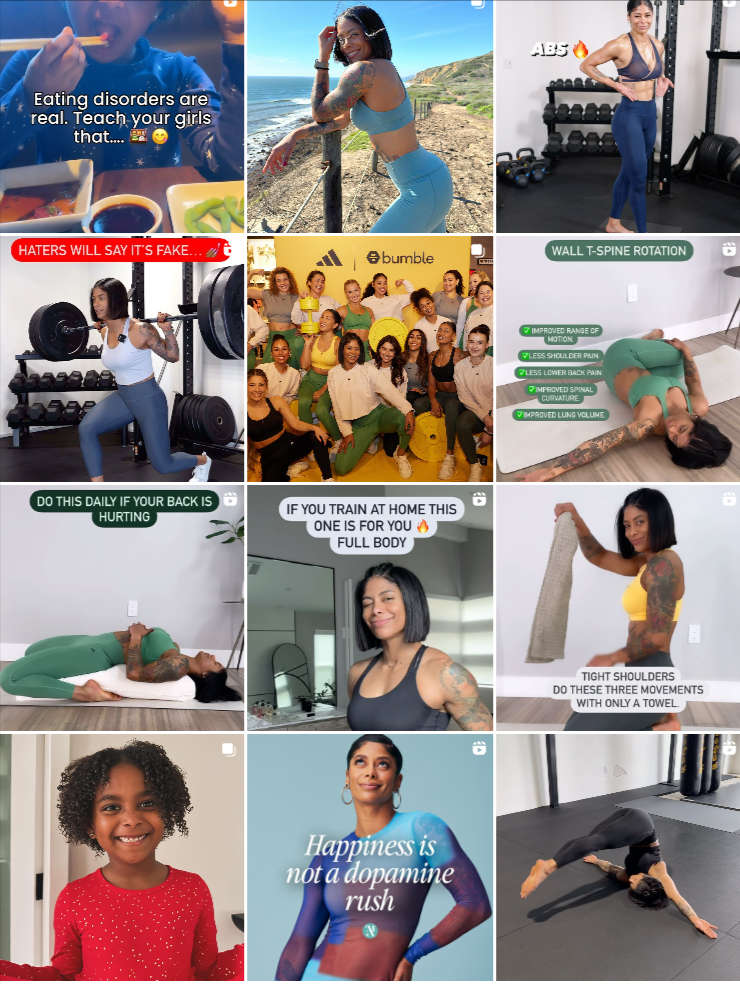
Set up Your Professional website
While many fitness coaches might skip creating their professional website, as they consider it to be slipping down the rabbit hole. However, a website is your first point of contact and an ideal place to funnel your audience from social media. A professional website builds trust and credibility.
Nevertheless, it stays relevant even amidst social media dominance. 75% of people assess a business’s credibility based on the website design and appearance.
So, what are the crucial website elements for an online fitness coach?
- Your training programs, courses, memberships, products
- An effective sales page with your unique selling proposition and CTAs
- Resources like blogs, newsletters, workout plans, etc.
- User Testimonials & Success Stories
- Booking page for 1:1 and group coaching sessions
- Your brand story and contact information
Keep your website design clean, visually-aesthetic and SEO-friendly.
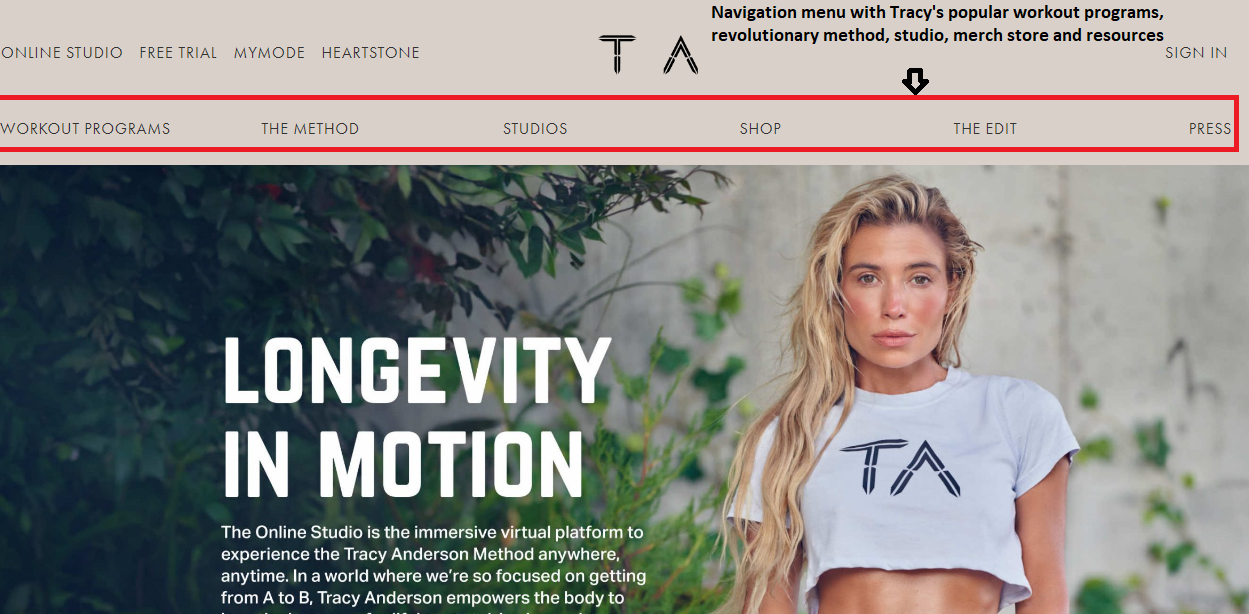
7. Create Your Online Training Course or Program
Now that you have a clear roadmap, it’s time to create your core offerings. Create your online training program or course based on your target audience and define a clear outcome based on your ideal client.
The following are the crucial aspects for designing your offerings:
- Define Outcomes
First and foremost define a clear outcome for your online training program. An outcome is what your audience will achieve or understand by the end of this course. For example, greater lower body flexibility. This attracts the right kind of audience!
Moreover, it could be a 7-day core challenge involving a series of workouts or a self-paced 30-day weight loss program with four sessions per week.
- Program Format
What type of services are you planning to offer? Are you offering live workout sessions or online courses? Typically, the popular formats are one-to-one classes, group classes, pre-recorded sessions, or hybrid programs.
- Program Frequency & Planning
Decide the number of modules and sessions under each module. A fitness training course could include pre-recorded workout sessions, a video library of sessions, PDFs, infographics or non-workout plans like recipes, lifestyle tips, or even quizzes.
If it’s a printed course, include detailed exercise instructions with all the visual elements and essential tips. A typical training program begins with warm-up sessions, main or core exercises, lastly cool-down exercises.
- Pricing
You can sell your training program at a package price, a one-off (charge per live class), or a membership price. Price your program based on the length, target audience, the value you offer through your programs and courses.
- Equipment
What kind of equipment does your online program demand? Mention clearly the essential and optional equipment for your training program. For example, dumbbells, barbells, and resistance bands are great for muscle-building exercises at home.
Keep your clients engaged with newsletters for 30-day programs and daily reminders for short challenges.
8. Market Your Fitness Coaching Business
“Work like hell, and then advertise,” states Arnold Schwarzenegger.
Now that you have your target audience, a master plan, and your offerings, it’s only half the battle won! Unlike real-world fitness coaching, a virtual fitness coach has to invest more in spreading the word. Of course, you can tap into your personal and professional network. But that won’t be enough!
The most important thing while starting is to transform your expertise into free content and attract your audience.
Here’s what a pitch-perfect coaching marketing strategy looks like:
- Create blogs and vlogs based on workout plans, nutrition meals, lifestyle tips, supplements, etc.
- Engage your audience on social media with engaging posts, live stream workout sessions, and challenges, and run flash sales or free consultations.
- Post consistently on local Facebook Groups (videos)
- Promote new training programs or courses, discounts, or share case studies with email marketing campaigns.
- Join fitness subreddits like r/Fitness, r/Nutrition, r/xxFitness, r/LoseIt, skim through the discussions and answer FAQs
- Start your podcast by inviting different fitness experts and gathering their insights and fitness tips.
- Target your audience through Facebook, Google and LinkedIn Ads.
- Create a local network of chiropractors, personal trainers, physical speech, and occupational therapists. Attend local events and chambers of commerce to meet new prospects.
- Be proactive in asking for referrals from your existing client network.
9. Scale Your Online Coaching
Consider that you have attained your initial milestone in the first three months, say, $10,000 in revenue. You have achieved this with a jam-packed private and group coaching call schedule. Now, what next to move the needle forward?
You need an effective strategy on how to grow your business!
First and foremost, don’t relate your income to hours; this limits the business’s scalability to your efforts! Instead, “leverage” your business, which is essentially amplifying your time and efforts to achieve your milestones.
We found Kieran Errington’s approach to leverage both interesting and liberalizing. Errington categorizes leverage in terms of four aspects: automation, labor, media, and capital.
Here’s a timeline on how to build leverage to scale your business:
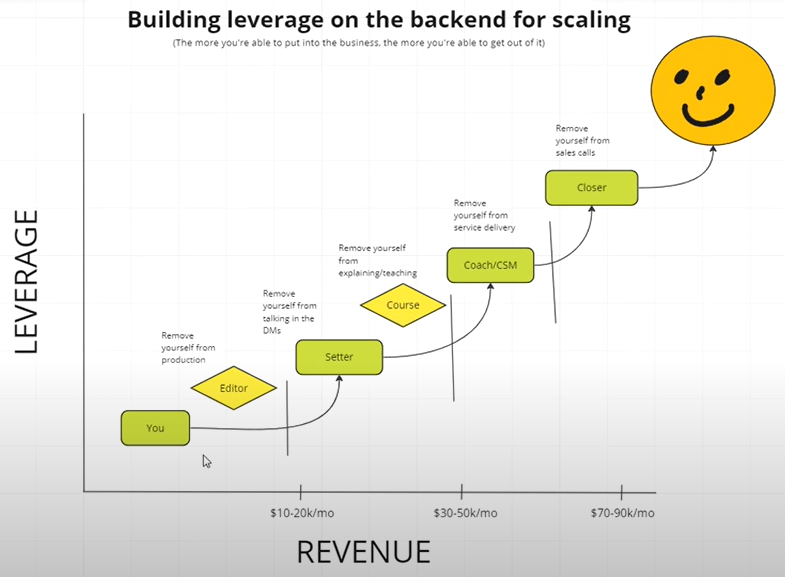
On reaching $10k – $20k per month milestone: Hire an editor to manage video production and a setter to handle DMs and schedule appointments.
After $30-$50k per month milestone: In this phase, focus on making your service more efficient. Create a course integrating your popular training fitness programs, nutrition plans, etc. Additionally, get a client success manager or coach to check in with clients, build an active community, and keep your community engaged.
After $70-$90k per month milestone: Don’t like sales? However, sales is a high-stakes call; you can’t compromise on your lead conversions. A practical solution is to hire a closer to land you better leads. Ensure that the individual is good enough and is able to close 80% of deals as compared to what you could do earlier.
You can take a look at Kieran Errington’s detailed video here:
Finally, we have reached the end of this step-by-step guide. You are now all set to become an amazing online coach! So, let’s look at the different ways you can keep your income flowing!
How Do Online Fitness Coaches Make Money?
There are multiple revenue streams for online fitness coaches. Let’s take a look at the best ones:
1. One-to-One Coaching Calls
If you have offered personalized training or one-to-one consultations in real life, you can also transition to online calls. A typical consultation includes a personalized training plan, meal plan and virtual training sessions.
2. Sell Workout Plans
Have an effective workout plan that yields results? You can easily sell your one-of-a-kind workout plans on a fitness app or studio and earn a passive income. For example, 12-week weight loss plan
3. Livestream Fitness classes
A great way to connect with your audience in real-time is by live-streaming your fitness classes! What piques your audience’s interest? It could be a great HIIT, Pilates, yoga, or cardio workout — pick something that’s worth their money!
4. Affiliate Marketing
Be an affiliate for a clothing brand or supplement company. You can earn a commission when a prospect purchases a product through your affiliate link or code. This is a win-win situation for both businesses and affiliates!
5. Be a Sponsored Athlete
You can even go a step further and become a sponsored athlete for a fitness brand. It’s similar to being an affiliate, but here, you earn an additional remuneration besides the commission. Approach small fitness brands, including fitness equipment, supplements, training providers, meal preparation companies and more.
6. Earn From YouTube Ads
If you have a considerable audience on YouTube, including sponsored ads within your videos is a great monetization strategy. These ads can be included as display ads (right side of the screen), overlay ads(bottom of screen) or video ads (before the video starts or in between).
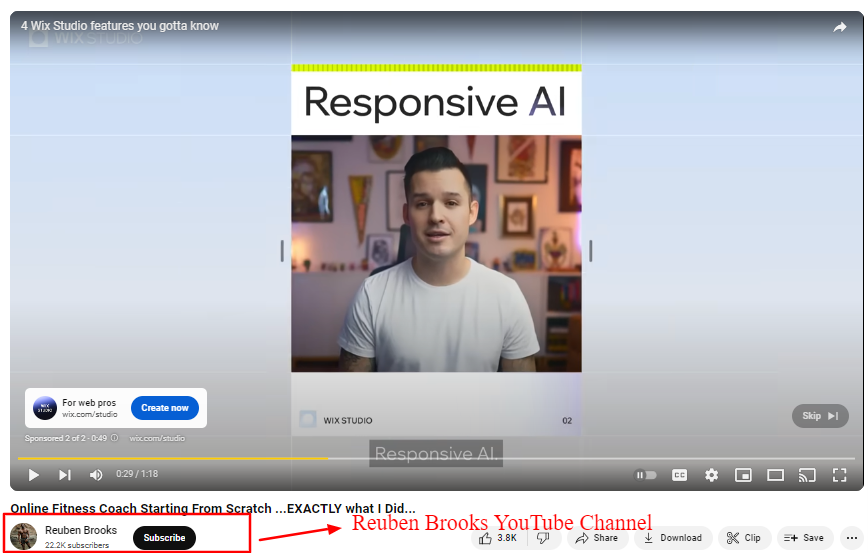
7. Start Podcasts
If you love interacting with people and are keen to grow your audience, start a podcast! Invite popular fitness coaches, nutritionists, personal trainers, or industry experts and gather insights and effective tips.
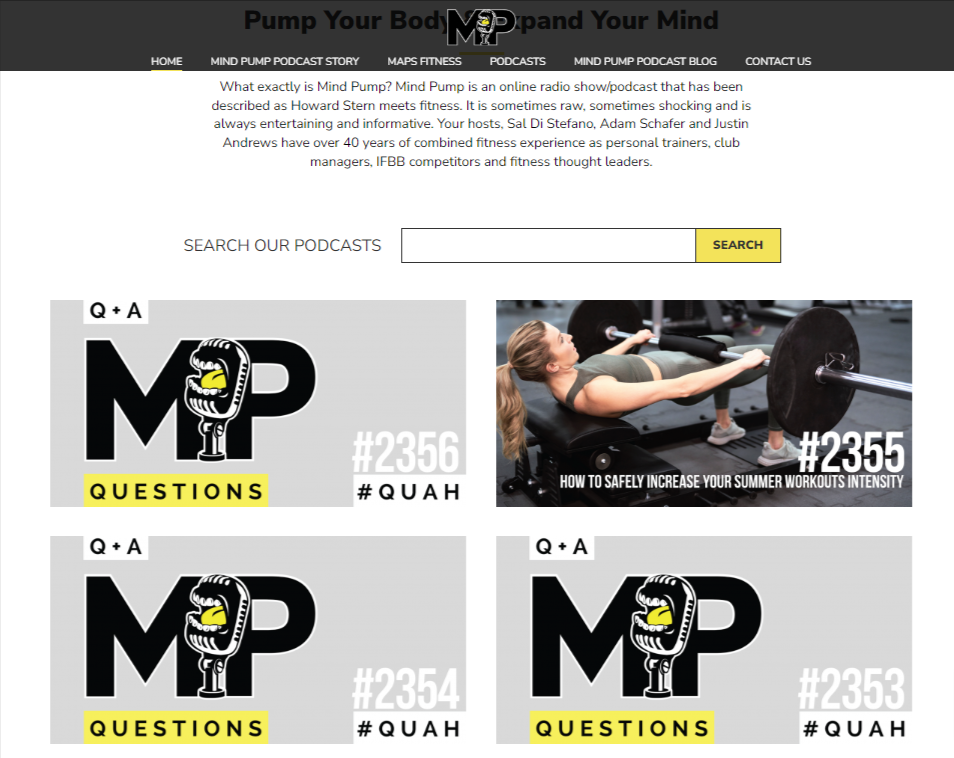
8. Launch an Online Fitness Studio
Once you have enough expertise and a good audience, you can launch your own fitness studio. You could either choose a one-off fee or a membership model for your studio. There’s much you can offer in your fitness studio: sell workout plans, training plans, detailed courses, live classes, etc.
For some solid proof of what online fitness coaches earn, the next section delves into the statistics.
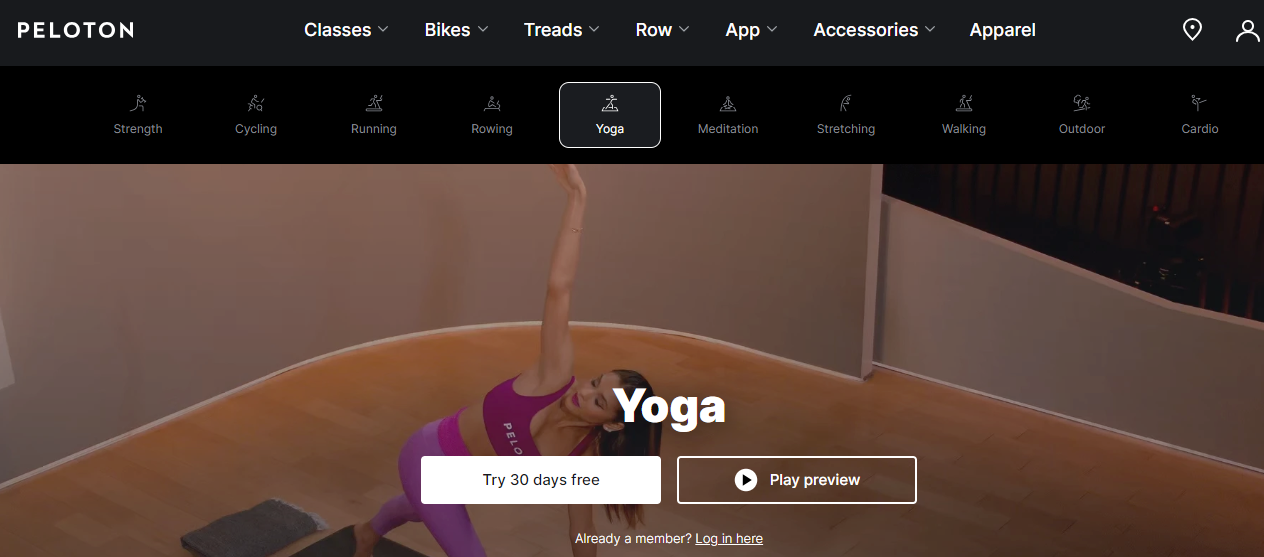
What is the Average Pay of Online Fitness Coaches?
Although there are no solid answers on how much online fitness coaches make, we have done our research on the prevalent trends.
According to Glassdoor, the average salary range of online fitness coaches is around $80,000 – $150,000 per year. The estimated total pay is about $107,000 per year.
According to ZipRecruiter, the average hourly pay for online fitness coaches in the United States is $28.74. While the top fitness coaches earn a whopping $126,000 per year ($60 per hour), beginners start at $20,500 per year ($9.86 per hour).
The money you earn depends on your expertise as a coach, client base, pricing, and the value you offer as an online coach.
Source: ZipRecruiter Average Hourly Rate of Fitness Coach in the United States
San Francisco, San Jose and Oakland are the cities with earnings above the national average for online fitness coaches.
Ready to Become an Online Fitness Coach?
Becoming an online fitness coach is certainly a lucrative career, but you might not attain stardom overnight! You need a well-crafted strategy, technical knowledge of the popular fitness platforms, lots of hard work and little luck to establish your six-figure fitness business. Start with in-person clients before stepping into the virtual landscape.
Most importantly, narrow down your niche to understand your ideal client and streamline your training programs and marketing strategies. If you wish to nurture a thriving fitness community, you can scale your business with a ready-made script like Pinlearn. Create an amazing marketplace that connects fitness coaches with their ideal clients and earns through diverse monetization channels!
FAQs-Related to How to Become an Online Fitness Coach
1. Is starting an online fitness coaching business profitable?
The online fitness market is expected to reach $256.97 billion by 2032. You can be a successful online fitness coach with expertise, a high-quality training program, a strong brand and effective marketing strategies to attract clients.
2. Can anyone be an online coach?
You can become an online fitness coach with the essential knowledge, experience with in-person clients, passion and physical fitness to train clients.
3. Can you become an online fitness coach without certification?
Yes, you can be an online fitness coach without certification. However, it is recommended that you get certified to offer quality training programs, reduce client injuries and minimize the overall risks involved while training.

